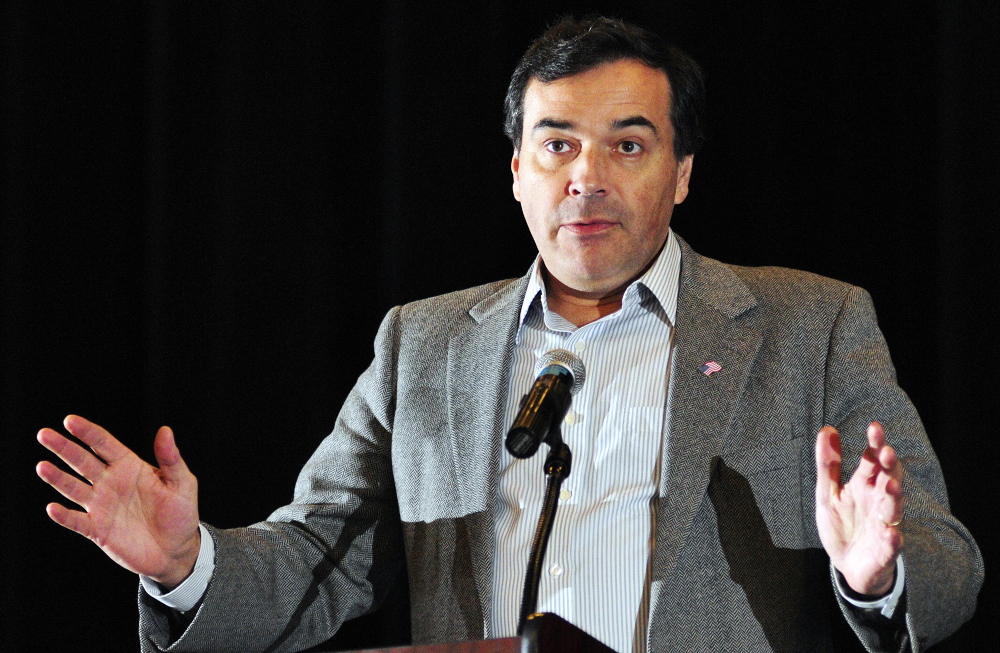AUGUSTA – In a historic move, Maine’s Electoral College electors are poised to cast a split ballot Monday when they act with colleagues across the country to finalize the 2016 U.S. presidential election.
Maine’s four electors will convene on the floor of the Maine House of Representatives at 2 p.m. to cast their ballots, with three of them set to vote for Democrat Hillary Clinton and one to vote for Republican Donald Trump.
It’s the first time in 28 years that a Republican presidential candidate has won an electoral vote in Maine, and the first time since before the Civil War that Maine divided its Electoral College votes.
Maine and Nebraska are the only states that allocate Electoral College votes based on the outcomes in each of their two U.S. congressional districts. Two of Maine’s four electoral votes go to the candidate with the highest statewide vote total, and the two others go to the candidate with the highest vote total in each congressional district.
Maine Republican Party Chairman Rick Bennett, an Oxford resident and the Electoral College elector for Maine’s 2nd Congressional District, said he intends to follow the “expressed will” of the voters in casting his ballot for Trump, who bested Clinton in Maine’s 2nd Congressional District on Election Day. The other three votes, coming from Diane Denk of Kennebunk; David Bright of Dixmont and Samuel Shapiro of Winslow, are expected to go for Clinton.
REFORMING ELECTORAL COLLEGE
Electoral College members are chosen during Democratic and Republican party conventions before the November election, with each party electing two at-large electors and an elector for each Congressional district.
Bennett said Wednesday in an appearance on WVOM radio in Bangor that he thought more states should move toward the system Maine and Nebraska use. He said that would add confidence in the Electoral College, which can allow candidates to win the White House even if they lose the popular vote nationwide, as Trump did this year.
“You would end up with a vote which is more reflective of the will of the entire country and it would require candidates to go out to some places they don’t even bother with and some states they just ignore,” he said.
He acknowledged that Clinton won more than 2 million more votes than Trump, but said the rules for the Electoral College are well established and accepted. Clinton won the popular vote in Maine, with 357,735 votes to Trump’s 335,593.
Bennett said in an interview Wednesday that calls for him to cast his vote for somebody other than Trump were really just an effort to “de-legitimize the president-elect’s election.”
“I understand peoples’ concerns, he’s an unconventional person in the presidency,” Bennett said of Trump. “He likes to be unpredictable, and he was elected because people want to shake up the system and what they see as a core level of corruption in the incumbent power struggle.”
He expects to see good attendance at Monday’s proceedings, including attention from protesters who would urge him to cast his ballot for Clinton. But he also said Republicans would be on hand to witness a historic moment in state history.
TRUMP WON MORE DISTRICTS
Paul Mills, a Farmington attorney, political historian and author, doubts other states will adopt Maine’s system.
“That’s in part due to the fact that we didn’t see much impetus after the 2000 experience when, like this year, we had a divergence between the popular and electoral vote,” Mills wrote in an email.
He said that even if other states apportioned their Electoral College votes by congressional district results, Trump still would have won the White House because he won more congressional districts than Clinton.
Denk, the Democratic elector for Maine’s 1st Congressional District, which voted for Clinton by a wide margin, said Monday was going to be a “bittersweet day” for her because she supported Vermont U.S. Sen. Bernie Sanders for president.
“It is going to be very difficult on so many levels on Monday,” Denk said. “But nothing will compare to the four years we have ahead of us under a Trump presidency.”
Maine last split its Electoral College votes 188 years ago in 1828. The state then had nine electors, and eight cast their ballots for the National Republican Party’s candidate and incumbent John Quincy Adams. One elector voted for Andrew Jackson, the Democrat, who won the White House by carrying 15 states and 178 Electoral College votes.
Send questions/comments to the editors.



